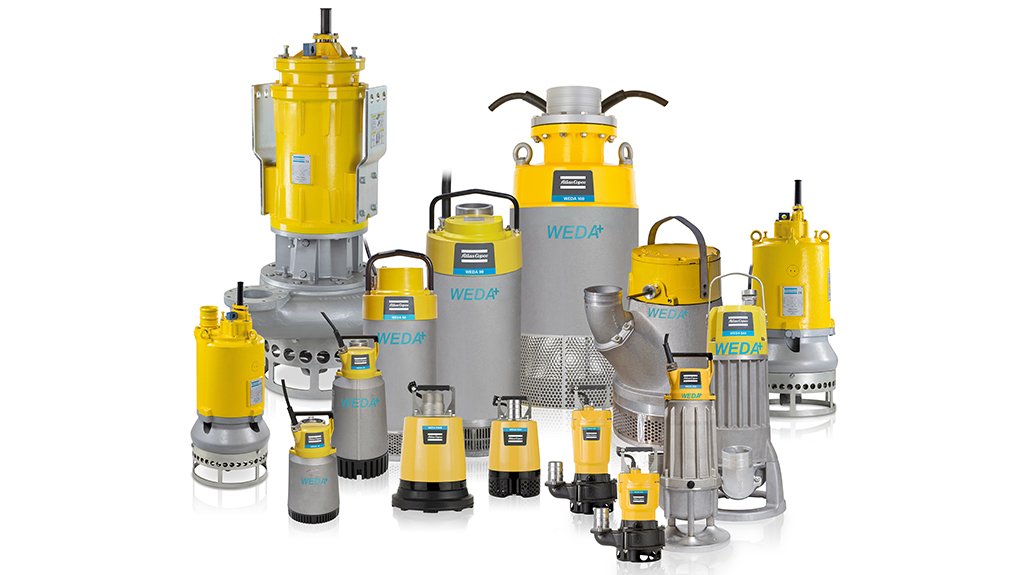Benefits of diesel vs electric pumps
The choice between using either a diesel or electric pump for dewatering projects depends on a variety of factors such as the volume to be pumped, the amount of solids in the liquid, emission limits or performance.
According to IPR product manager Steve du Toit, there are five main considerations when weighing the comparative advantages of diesel and electric pumps.
“The first consideration is usually the volume of water to be discharged, and this relates to the power and flow of the pump,” says Du Toit. “Atlas Copco’s diesel-powered centrifugal pumps are designed for high volumes – with a typical flow range of 10 to 1 500 cubic metres per hour.”
Related to the pump’s power is the head it can achieve, which for these pumps can reach over 50 m. He notes that the pumps are also able to operate in a variable speed range, so they can manage different flow-head combinations.
“By way of comparison, electric submersible pumps can offer power ratings up to around 80 kW and can typically manage flows up to 20 000 litres per minute with a maximum head of 85 m,” he explains. “This range is typical but there are some higher head pumps also available.”
The second consideration is the amount and nature of solids in the water to be pumped. Diesel-driven centrifugal pumps can manage both clean and dirty water as well as water carrying trash and fibrous materials. Thanks to features such as semi-open impellers and abrasion-resistant pump casings, these pumps can handle solids up to 76 mm in size.
“In contrast, electric submersible pumps have the ability to handle abrasive materials and solids up to 12 mm – or even higher with sludge pumps,” he says. “When a project involves the pumping of suspended solids, it is ideal to equip the pumps with hardened impellers.”
Thirdly, it is important to consider the application’s particular limitations - underground mining, for instance, will usually require the units to be easily portable and to have no emissions. This makes electric submersible dewatering pumps the right choice.
“On the other hand, fully automatic self-priming diesel centrifugal pumps are the de facto choice for delivering fast dewatering solutions to sites where an alternative power source, such as a generator or mains feed, is not available,” says Du Toit.
He highlights the performance of dewatering pumps as a fourth point to consider. Submersible pumps can provide days of unattended dewatering operations – even in the toughest environments where the water table needs to be lowered.
“They will also have less noise impact on the immediate environment, so they can be run during the night even in densely populated areas without causing any disturbance,” he said. “Some models can run for up to 2 000 hours without needing attention, and can even sustain dry running conditions.”
Atlas Copco centrifugal pumps have fuel autonomy of around 40 hours, and are designed to operate even when significant volumes of air are introduced. They can run in these ‘snore’ conditions as a result of an oil-free diaphragm vacuum pump’s automatic priming. Extra-large fuel tanks can allow them to run for longer periods without refuelling.
The fifth factor in selecting pumps is the maintenance and service, says Du Toit. Atlas Copco’s electric submersible pumps are said to be durable and offer high wear resistance. The modular construction of the pumps simplifies maintenance and some models are also equipped with on-site servicing and parts replacement kits, including seals and impellers.
“Maintaining centrifugal pumps is also easy and simple, with the exception of replacing wear parts and engine filters,” he concludes. “An important feature of this type of equipment is the inclusion of advanced controllers with data monitoring capabilities; these can alert the owners or operators when service interventions are required.”
IPR was recently appointed as the master distributor in Southern Africa for Atlas Copco dewatering pumps. IPR carries a wide range of diesel-powered and electric Atlas Copco pump solutions for purchase or rental.
Article Enquiry
Email Article
Save Article
Feedback
To advertise email advertising@creamermedia.co.za or click here
Comments
Press Office
Announcements
What's On
Subscribe to improve your user experience...
Option 1 (equivalent of R125 a month):
Receive a weekly copy of Creamer Media's Engineering News & Mining Weekly magazine
(print copy for those in South Africa and e-magazine for those outside of South Africa)
Receive daily email newsletters
Access to full search results
Access archive of magazine back copies
Access to Projects in Progress
Access to ONE Research Report of your choice in PDF format
Option 2 (equivalent of R375 a month):
All benefits from Option 1
PLUS
Access to Creamer Media's Research Channel Africa for ALL Research Reports, in PDF format, on various industrial and mining sectors
including Electricity; Water; Energy Transition; Hydrogen; Roads, Rail and Ports; Coal; Gold; Platinum; Battery Metals; etc.
Already a subscriber?
Forgotten your password?
Receive weekly copy of Creamer Media's Engineering News & Mining Weekly magazine (print copy for those in South Africa and e-magazine for those outside of South Africa)
➕
Recieve daily email newsletters
➕
Access to full search results
➕
Access archive of magazine back copies
➕
Access to Projects in Progress
➕
Access to ONE Research Report of your choice in PDF format
RESEARCH CHANNEL AFRICA
R4500 (equivalent of R375 a month)
SUBSCRIBEAll benefits from Option 1
➕
Access to Creamer Media's Research Channel Africa for ALL Research Reports on various industrial and mining sectors, in PDF format, including on:
Electricity
➕
Water
➕
Energy Transition
➕
Hydrogen
➕
Roads, Rail and Ports
➕
Coal
➕
Gold
➕
Platinum
➕
Battery Metals
➕
etc.
Receive all benefits from Option 1 or Option 2 delivered to numerous people at your company
➕
Multiple User names and Passwords for simultaneous log-ins
➕
Intranet integration access to all in your organisation




















